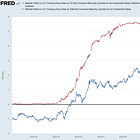BRIEFLY NOTED: For 2023-12-15 Fr
Ballad of Lucy Gray Baird; Andromeda Galaxy; very briefly noted; & reflections on "Team Transitory", trying to think about GPT-LLM-ML, SubStackers vs. Nazis, & BRIEFLY NOTED: For 2023-12-13 We...
Backups & robustness; firepower; smart glasses; Ballad of Lucy Gray Baird; Andromeda Galaxy; very briefly noted; & reflections on "Team Transitory", trying to think about GPT-LLM-ML, SubStackers vs. Nazis, & BRIEFLY NOTED: For 2023-12-13 We...
SubStack NOTES:
Attention-Info-Biotech Economy: Backup people! Backup your backups! And always remember: cloud storage is not a backup! And have a backup device as well (connects backup USB drive to main computer; goes and digs in box for antiquated laptop and plugs it in for its battery to charge):
Roger Shrimsley: My struggle to live without an iPhone—for two whole hours <https://www.ft.com/content/4392d0af-f6b9-459f-842e-69d7ecb046cf>: ‘Then came the horror. No email, no phone, contact numbers, no text, no X. I had also lost our mapping app. We were visiting our daughter at her new university digs and had no idea how to get there, or where she lived because the address was in my now irretrievable texts. I did not know her phone number, because who knows phone numbers these days?… I was off-grid for no more than two hours. And yet, in that period, I could not focus on anything else. So, aside from the obvious point about the iniquity of Range Rovers and the fickleness of wives, this rammed home the lesson that I really have a dependency bordering on addiction…. We’ve all seen those thrillers where the hero has to drop off the grid to survive. In that instance, reader, I am doomed…
War: I would like to remind Noah Smith that there were an awful lot of attrition battles in World War II—Moscow Nov 1941, Soviet counteroffensive Nov 1941-Feb 1942, Stalingrad Oct-Nov 1942, Moscow Nov 1942-Feb 1943, Normandy June-July 1944, WestWall Oct-Dec 1944, and so forth. In my view, something has to go badly wrong—usually, I think, air supremacy for the other side—for an attrition defense to become difficult for an industrial army. And that has been the rule since 1861. Remember, Sherman’s 1864 March through Georgia was only possible because John Bell Hood had taken the local Confederate field army and marched it off into Alabama and then Tennessee, thinking that Sherman would have no choice to follow:
Noah Smith: Some thoughts on where the war in Ukraine is headed <>: ‘In summer and fall of 2023, Ukraine tried to take back… territory, using tanks, mine-clearing vehicles, and other weapons provided by Western countries. This effort completely failed. The reason… is… modern-day weapons… are able to destroy armored vehicles very easily…. Rapid, tank-led blitzkriegs that defined World War 2 are mostly a thing of the past, at least without overwhelming airpower. Land war has sort of gone back to what it was in WW1—a slow grinding fight for small bits of territory where firepower and resources matter more than brilliant maneuvers…. If the war ended tomorrow, it would be a… successful independence struggle and nation-defining episode for Ukraine…. A lot of Ukrainians would be mad that 18% of their country was still occupied by the Russians, of course, and would resolve to get it back at a later date…. The real danger is if the West cuts off Ukraine aid, and Putin eventually manages to conquer all of Ukraine…. The task of supporting Ukraine for the long term now falls to Europe…
GPT-LLM-ML: The idea is that answering your questions about the context and background of what you are currently looking it is likely—likely—to be something that these tools can do without hallucinating too much, and that people will be willing to pay for. The alternative at the moment seems to be “AI” tools as a better version of Microsoft’s infamous Clippy—and, save for programming copilots, that seems even further out of our current reach as opposed to the sweet spot we are aiming for. But new device categories are very rare: the PC, the Macintosh (if you call that really different from the text-on-green-screen PC, the smartphone, the tablet (sort of), the digital watch, the airpod… Notice anything about these genuinely-useful device categories?:
Erin Woo, Jon Victor, & Anissa Gardizy: OpenAI, Meta, Microsoft Chase Wearable AI <https://www.theinformation.com/articles/tech-giants-chase-wearable-ai>: ‘It’s a vision many of the companies have discussed or worked on for years, but they have a new reason to think they can pull it off: the sudden rise of multimodal AI that understands drawings, charts, objects and hand gestures in addition to text and audio. For instance, OpenAI recently discussed embedding its object recognition software, known as GPT-4 with Vision, into products from Snapchat’s parent company…
ONE AUDIO: Rachel Zegler: Ballad of Lucy Gray Baird:
Best riff EVAR on “Streets of Laredo”…
ONE IMAGE: Andromeda Galaxy:
Very Briefly Noted:
Economics: Larry Summers: We haven’t nailed the landing yet <https://www.ft.com/content/59fff67e-b136-4435-89e1-2400b90f4b83>: ‘Look at underlying inflation rates… some… are still running well above 2 per cent. If inflation is currently at 2 per cent, it’s not clear that it won’t go back up again. And it isn’t clear that the landing has been soft… declining flows of credit, inverted yield curves, aspects of consumer behaviour… credit strains… raise the possibility that the landing won’t be soft…. The landing may be hard, and we may overfly. That said… hav[ing] inflation above 4 per cent and unemployment below 4 per cent, and you extricate from that situation without a recession… has never happened before in the United States…. And it certainly looks in play as a possibility…. Primary credit should be given to the Fed for having acted relatively rapidly to correct its earlier errors…. The Fed in 2022 raised rates very sharply in a way that did not take place during the Vietnam period. So I think that, ironically, if team transitory proves to be vindicated, it will only be because their policy advice was not taken. It will be because the Fed moved strongly enough that [inflation] expectations never became unanchored…
Robert Armstrong: Unhedged <https://www.ft.com/unhedged?emailId=d33ed32e-9834-4c37-8928-5c7ec9fa95c5&segmentId=38af067e-f67a-09ef-7f9d-cb40b4153a58>: ‘Yesterday the 10-year Treasury yield fell below 4 per cent for the first time since July, as the market continues to process Wednesday’s pivot by the Federal Reserve. On the equity side, small-cap stocks continue to be the story: while the S&P 500 has shrugged, the Russell 2000 is up 6 per cent since Jay Powell started talking…
Michael Strain: The Myth of the 1% <https://www.project-syndicate.org/commentary/america-must-focus-on-ordinary-workers-wages-not-top-earners-income-share-by-michael-r-strain-2023-12>: ‘Income inequality across all households… accounting for taxes and government transfers… increased by 29% between 1979 and 2007, but then fell by more than 5% between 2007 and 2019…. Even though inequality was rising in the 1990s, average wages were also increasing; Americans were not concerned about whether they were growing faster for some groups than for others. But after the 2008 financial crisis, average wages… fell so sharply… that it took until 2014 for the median real wage to recover its 2007 level. This prolonged period of wage stagnation fomented anger and a sense of injustice—of a “rigged” economic game—which gave rise to populism. The lesson is clear: people care about how they themselves are doing, and not about a group of people with whom they seldom interact. People are not as dripping with envy as the debate over inequality would have you think…
Maurice Obstfeld: Natural and Neutral Real Interest Rates: Past and Future: ‘The decline in real interest rates in advanced and emerging economies… [was driven by] a range of global factors that have operated with different force in different periods…. Estimates of long-run equilibrium real rates (r̄) may not always furnish an accurate guide to the rate appropriate for short-term monetary policy (r*)…. Monetary should consider not only equilibrium in the market for domestic goods, but also the current account balance, financial conditions (including capital flows), and imperfect policy credibility…. The main underlying factors that have pushed real interest rates down since the 1980s and 1990s—notably demographic shifts, lower productivity growth, corporate market power, and safe asset demand relative to supply—do not appear poised to reverse strongly enough to drive a big and durable rise in global real interest rates over the coming years. Low equilibrium interest rates may well continue periodically to bedevil monetary policy and financial stability…
Justin Wolfers: ‘Fed statement <https://www.threads.net/@justinwolfers/post/C0zh50NJv8P>: No change in rates…. The Fed is more convinced that real activity is slowing…. It's a moderately dovish statement, explaining the shift away from a tightening bias…. 2023 numbers: This was a year that delivered (much!) slower inflation than anticipated, even as growth was quite a bit stronger than expected…. Not really a miracle… [but] what you would expect from an economy experiencing a positive supply shock…. [With] the so-called "dot plot" tells us where the Fed expects interest rates to go… we see the admission that interest rates have gone as high as they're going, and at some point in 2024 we'll see two, three or four rate cuts.Moreover, the Fed is also penciling in a bunch more rate cuts through 2025. Read this as saying: As soon as we're convinced inflation is back down to 2%, we'll start cutting rates, maybe even pretty aggressively…. Also, notice the Fed is expecting rates (eventually) returning to 2.5%. There's been some talk that the neutral rate may have risen, but the Fed ain't buying it…
Tim Duy: Fed Watch: ‘We predicated our pivot at the beginning of November to a March rate cut on the recognition that with inflation coming down faster than anticipated, the Fed would circle back to protecting the employment side of the mandate…. The Fed validated our pivot…. The totality of the FOMC outcomes was more dovish than markets anticipated, and this week’s inflation data likely pushed the Fed over the edge in that direction…
Public Reason: Hannah Arendt (1971): Lying in Politics <https://www.nybooks.com/articles/1971/11/18/lying-in-politics-reflections-on-the-pentagon-pape/>: ‘The extreme fringe had the unhappy inclination of denouncing as “fascist” or “Nazi” whatever, often quite rightly, displeased them, and of calling every massacre a genocide, which obviously it was not; this could only help to produce a mentality that was quite willing to condone massacre and other war crimes so long as they were not genocide…
Timothy Burke: The News: Well, How Did They Get There? <http://timothyburke.substack.com/p/the-news-well-how-did-they-get-there>: ‘Kathryn Joyce and Jeff Sharlet’s essay “Losing the Plot” on left-wing intellectuals and writers who end up in the company of the far right, travelling a “horseshoe” arc…. People… certain that only economic hierarchy… matters…. When… the ‘left’ seems to them to be consumed by cultural issues… they decide that there must be something wrong with the left…. The other kind of person who makes this sort of “horseshoe move”… is just chasing the transgressive pot of gold at the end of any political rainbow…. People [who] make the horseshoe loop… were always foredoomed to do so…. [Eugene] Genovese was always driven by a bleak loathing for Northern critics of the slave-holding South because he saw them as the tribunes of an even worse industrial capitalist order…. It’s… [the] affective orientation…. The person who… [thinks] they are the master chef and we are all the eggs that must be broken… does not believe in a better world. The person who wants to be harder than the rest of us… does not believe in a better world. The person who writes about Goldman Sachs as a vampire squid but whose defense against charges of misogyny was that he hates everybody is not dreaming of a better world…
Human Capital: Daniel W. Drezner: You Could Not Pay Me Enough to Be a College Administrator <https://danieldrezner.substack.com/p/you-could-not-pay-me-enough-to-be>: ‘The primary job of any college dean or university president is to deal with the most spoiled, entitled, pig-headed interest groups imaginable. First, there are the students…. If the students are bad, the tenure-stream faculty are worse…. The lower-level administrators, the folks charged with actually making sure the trains run…. Both students and faculty treat them as the lowest of the low…. This can lead to extreme surliness…. Woe to the senior university administrator who crosses the folks who manage all their necessary but byzantine paperwork…. The alumni, the donors, and the state…. College presidents and school deans have two jobs: 1) raise money; and 2) find ways to appease students, faculty, administrators, alumni, donors, and the state. The one trait all these interest groups share is a powerful sense of entitlement in telling university presidents and college deans exactly how to do their jobs…
GPT-LLM-ML: Dan Shipper & Linus Lee: How an AI Researcher Uses
ChatGPT and Notion AI <https://every.to/chain-of-thought/how-an-ai-researcher-uses-chatgpt-and-notion-ai>: ‘Using AI to maximize agency…. AI as a “thought calculator.”…Personal prototypes…. Better prompting….. Using AI for vibe checks…. Book recommendations...










Summers: I don’t think Summers is being as helpful as he could be in taking stock of past discussion of monetary policy as he could be. HIS earliest warnings were of too large fiscal deficits, NOT of the Fed waiting too long before starting to bring inflation that was temporarily in excess of target, back to target. Referring to Fed errors that he did not call as errors in real time shows poor grace, even if they WERE errors. He correctly points out that the Fed has not managed to reduce inflation from above target to target without recession in a coon’s age, but gives absolutely no indication of why he thinks this time could not be different.
Strain: I guess it’s fortunate that people did not “drip enough envy” that decrease in inequality after 2007 led them to ignore their own situation. But ultimately, so what? We need large increases in revenues to reduce our growth-inhibiting budget deficits (that shift the terms of trade against tradeables). Where should a disproportionate part come from? From the beneficiaries of the Regan, GWB, and Ryan-Trump tax cuts for the rich and deficits acts.
Wolfers: Vague as it is, there is probably little harm done, I’m deeply distrustful of the Fed speculating about its future actions via the “dot plots,” without specifying what future observations of what data would lead the Fed to choose those interest rates as most appropriate to achieving its targets.
Team Transitory policy advice: Never very clear. I think Team Transitory had the right diagnosis, that inflation was needed to allow the economy to adjust to sectoral shocks, NOT to reduce real wages pushed up by a “wage price (expectations) spiral.” That correct diagnosis did not, however, give precise policy guidance about how long over target inflation should be allowed to continue and how rapidly it should be brough back to target.
Upvoted for the Ballad of Lucy Gray Baird. My grandfather's favorite song was Streets of Laredo.